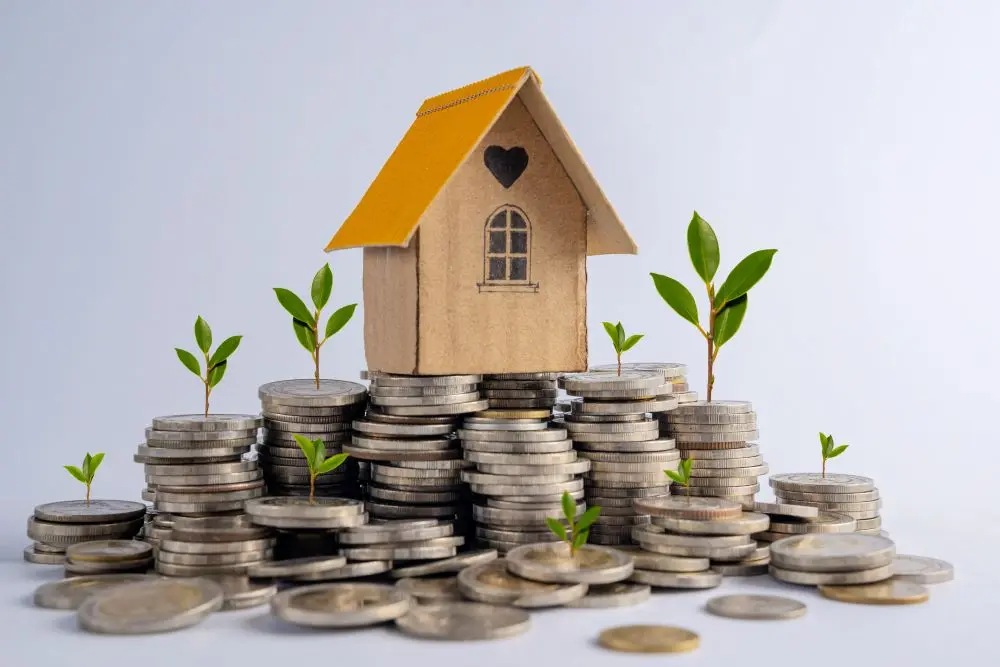Property investment is the choice of many people because it can provide tempting profits. Because, from time to time, the price will continue to rise.
However, before you decide to start property investment, you should first know the meaning, types, benefits, risks and tips so you can run it optimally.
1. What is Property Investment?
Property investment is a type of investment that you can make by buying real estate property to get a return on investment, either through future sales, rental fees or both.
Usually, property investments are made for the long term. However, if you want to do it for the short term, then you can do flipping. This means that you as an investor buy a property, then renovate it and sell it again in a short time.
You need to remember, the property you use for investment is not used for your personal or main residence, OK? The thing is, you are focused on using this property to generate income only.
According to Rocket Mortgage, there are 3 signs that you are ready to invest in property, namely stable financial condition, knowing that there is a return on investment, and having plenty of time to manage the property you purchased.
2. Types of Property Investment
If you are interested in starting property investment, you must first know what types of property you can invest in, including:
2.1 Commercial
Commercial property is usually purchased specifically for business purposes. Because you buy it only for business purposes, the costs for maintaining and improving its quality are not small.
Even so, you don't need to worry because the costs incurred are usually covered by sales proceeds and rent.
Examples of commercial properties include retail stores, office buildings, hotels, shopping centers, warehouses and apartments.
2.2 Residential
The first type of property investment is residential, where you can rent out your house to earn additional income. You can start this investment by buying residential property or housing, then renting it to other people. From this rental income, you will get house rental costs every month.
Examples of forms of residential property that are often used are houses, apartments and condominiums.
2.3 Mixture
You can use mixed property types for residential and commercial purposes simultaneously. Frequently encountered examples of mixed properties are shophouses and boarding houses.
Usually, the upper part of the shophouse will be used as a residence or rented out as a boarding house. Then the lower part is used for business activities, such as shops, restaurants and others.
3. Benefits and Risks of Property Investment
Before starting property investment, you must first know the benefits and risks, namely:
3.1 Benefits of Property Investment
There are several benefits you can get from property investment, including:
3.1.1 Suitable for Passive Income
The biggest advantage of property investment obtained by investors is achieving passive income. Every month, you will earn money from people who rent property. Of course, as long as your income is greater than your expenses, you will get positive cash flow.
3.1.2 Property Sales Values Always Increase
The selling value of property is relatively high and tends to increase every year. Therefore, for those of you who are interested in having savings for the future, this type of investment is suitable for you to choose.
3.1.3 Can be used as collateral
You can use property investment as collateral when you want to apply for a large loan. Land and property assets have high value because they are one of the primary human needs. Interestingly, collateral using property will usually make the loan application easily approved by the bank or loan owner.
3.1.4 Has Many Interested People
The need for housing makes the property business much sought after by the public. Apart from that, many people are looking for shophouses or business locations to develop their business.
Therefore, this business is quite promising because there are many people interested. You can take advantage of this opportunity to earn high additional income.
3.1.5 Physically Visible
In contrast to stock investment, investment in property can be seen physically. This is the reason why many capital owners invest and make a lot of profit from rental properties.
3.2 Property Investment Risks
Meanwhile, common property investment risks include:
3.2.1 Requires Large Capital
Starting to invest in property requires large capital. Not only to buy property, you need additional capital for maintenance costs.
Moreover, every year property prices soar. If you buy property now, then next year the property price will definitely be different.
Make sure to use cold money when you want to buy property for investment so you don't run into other big risks.
3.2.2 High Investment Protection Costs
As the owner, you are obliged to repair any damage that occurs to the property. The thing is, if the property looks damaged, it will usually be difficult to find tenants. Apart from that, you also have to continue paying the mortgage if the property is still empty, i.e. there are no tenants.
Any repair of damage that occurs certainly requires large costs. It is not surprising that the risk of having property investments is that you must be prepared to have funds for quite high property protection costs.
3.2.3 Difficult to trade quickly
Unlike other assets, such as gold and shares, property is a type of asset that is difficult to buy and sell in a short time. So, you cannot use property to meet emergency funding needs.
3.2.4 Takes a lot of time
Another risk when investing in property is that it takes a lot of time. You must take the time to take care of the property you want to invest in. Such as providing maintenance or controlling the situation in the property area. However, you can hire a third party to do this task, but you must be willing to incur additional costs.
3.2.5 Easily Destroyed in the Event of a Natural Disaster

Property investment is also classified as having a high risk if natural disasters occur, such as floods, landslides, earthquakes, tsunamis and others.
However, this can still be resolved with insurance. So, destruction of land and buildings can be eliminated by paying additional costs to pay insurance.
4. Legal Aspects in Property Investment
Before knowing how to start property investment and tips, there are several legal aspects that are important for you to know, namely:
4.1 Local Authority Licensing and Approval
If you want to build property for shophouses, housing, shopping shops, retail or factories, make sure to get permission and approval from the local authorities.
These permits consist of donation, environmental, construction and other permits. The purpose of licensing and local authority approval is to avoid legal problems that could occur one day.
4.2 Ownership Rights and Land Certificates
Make sure that the property you want to buy has ownership rights and a land certificate to avoid legal problems, such as disputes over ownership or inheritance rights.
Do thorough legal research regarding the property so that once ownership is yours, you can immediately rent it back safely.
4.3 Property Tax
Another legal aspect that is important for you to know is related to local and national property taxes. Understand property tax regulations and understand how much you have to pay and the deadlines.
4.4 Understanding Contracts and Agreements
Understand contracts and agreements to avoid contract violations when investing in property. You can also collaborate with legal experts or experienced legal consultants in the property sector for any problems that occur.
4.5 Comply with Construction Laws
Make sure you comply with applicable construction laws, such as building inspections, building standards and safety regulations to prevent undesirable things.
4.6 Consumer Protection
As an owner, you must ensure consumer protection when selling a property. For example, informing about matters related to buildings, sales agreements and buyer's rights.
5. How to Start Property Investment
After knowing the important things related to property investment, now is the time for you to start knowing how to start investing in this property sector, namely:
5.1 Online Property Investment
As time goes by, now you can invest in property online, meaning you don't need to buy a building directly.
Several ways to invest in property online, consisting of:
5.1.1 Property Equity Crowdfunding
The first way you can do this is through property equity crowdfunding, where you can join forces with other investors on an application or platform that provides this service. Of course, you only need to spend a small amount of capital to invest.
For example, if you want to invest by buying a house for IDR 1 billion, you only need to invest 1% of the property price or around IDR 10 million. For the rest, there will be other investors who will help and collaborate in the financing. Very interesting, right?
5.1.2 Buying Property Issuer Shares
Furthermore, you can also buy shares of property issuers from the securities company's online stock trading application. You only need to spend a small capital starting from IDR 100 thousand. Apart from buying shares, investors can sell and analyze them via the stock chart feature available.
5.2 Rental System
The next way to start property investment is to rent out assets, such as apartments, houses, townhouses and condominiums for residence. Apart from that, you can also buy shophouses, office buildings or retail stores to rent out as business or commercial premises.
Of course, from the results of renting this property, you will get profits every month or year.
5.3 Flipping Property Investments
Lastly, there is flipping property investment, which means you buy property at a cheaper price than the market price. Next, you can carry out renovations so that you can resell it at a much higher price.
This technique is known as flipping, while the person who does it is called a flipper. For example, you buy a used house for IDR 100 million, then renovate it and sell it again for IDR 400 million.
This model is used for short-term investments because the whole process is relatively fast and makes a profit in a short time.
6. Tips and Tricks for Success in Property Investment
If you are sure that you want to invest in property, make sure to pay attention to the following tips and tricks:
6.1 Searching for Property Type
The first tip and trick for success in property investment is to look for the type of property that suits your wishes. There are many types of property that you can choose from, including houses, shophouses or empty apartments. Usually the price of an empty house will be more expensive because it can be occupied directly by tenants.
When choosing a property type, make sure you adjust it to your long-term needs, OK? The thing is, each type of property has its own advantages and disadvantages.
6.2 Select Properties from New Environment
New environments or areas usually have good investment value because they are still unexplored. These areas will offer growth opportunities as well as tax incentives for buyers. So, you can maximize this opportunity by looking for property in this new neighborhood.
6.3 Check Completeness of Facilities
If you invest in property for a boarding house or apartment, make sure to check the completeness of the facilities. Properties with complete facilities have a lot of interest because tenants don't need to spend additional budget for the facilities anymore.
Interestingly, you can increase the price of property with complete facilities as long as it's not too significant, OK? Renters will usually accept it because it is more practical without needing to bring items other than clothes.
6.4 Conduct Market and Location Research
It is important for you to do market and location research to understand current market conditions. Starting from finding out property price trends, infrastructure developments around the property you want to buy and the number of rental requests.
Choosing a strategic location will help increase rental demand as well as the value of the property itself.
6.5 Conduct Financial Analysis
Before investing in property, you must do a financial analysis first. Make careful calculations starting from property rental income, maintenance and repair costs to the possibility of the property being empty or having no tenants.
Make sure you are able to carry out a good financial analysis so that investment in this property sector can provide benefits. Also make sure you have an emergency fund to anticipate sudden additional costs.
6.6 Consultation with Property Experts
If you feel you need to have a consultation, do it immediately with an experienced property expert. Because, they can help you by providing important advice and guidance when you want to make investment decisions.
Property experts will help by providing an assessment of the property you want, providing relevant information regarding the property market and developing the best offer strategy.
6.7 Join a Community
If you are still a beginner in this field, you don't need to hesitate or be afraid. Because, everyone who is involved in the property investment business was originally like you.
Join a community that focuses solely on property investment. Then, build relationships and find a mentor who can help you learn and gain experience while investing.
6.8 Manage the Building Well and Professionally
The final tip and trick for successful property investment is being able to manage the building well and professionally. You must ensure that the property is always maintained, make repairs if there is damage and maintain a good relationship with the tenants.
If you don't have enough time to do all that, consider enlisting the help of an experienced property manager. You only need to incur additional costs without reducing many profits.
This is information about property investment that you can find out. So, have you prepared funds to start this investment? Make sure to understand all the risks and benefits and choose the type of property according to your budget. Use the tips and tricks that have been explained to help develop the investment in the property sector that you are planning to carry out.
---
BFI Finance is a trusted financing company in Indonesia that has been established since 1982. We provide financing for various needs such as business capital, education, home renovations, and consumer needs. Pledge your Vehicle BPKB or House Certificate to get a fast and easy financing process. Enjoy high disbursement (80% of vehicle value) and competitive interest rates! #SelaluAdaJalan with BFI Finance.







